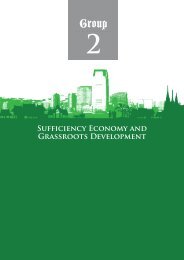Conflict, Legitimacy and Government Reform: Equitable Allocation of ...
Conflict, Legitimacy and Government Reform: Equitable Allocation of ...
Conflict, Legitimacy and Government Reform: Equitable Allocation of ...
Create successful ePaper yourself
Turn your PDF publications into a flip-book with our unique Google optimized e-Paper software.
80 KPI Congress XI<br />
Those <strong>of</strong> us who are advocates for the centrality <strong>of</strong> civic education<br />
in schools believe that there is a relationship between the drift <strong>of</strong> civic<br />
education to the periphery <strong>of</strong> our schools’ curriculum <strong>and</strong> the declining<br />
health <strong>of</strong> our democracy. Unfortunately, there are many signs <strong>of</strong> ill<br />
health in our democratic society. Increasing numbers <strong>of</strong> Americans are<br />
disengaged from civic <strong>and</strong> political institutions such as voluntary<br />
associations, religious congregations, community-based organizations,<br />
<strong>and</strong> political <strong>and</strong> electoral activities such as voting <strong>and</strong> being informed<br />
about public issues. Young people embody these trends <strong>and</strong> are less likely<br />
to vote <strong>and</strong> less interested in political discussion <strong>and</strong> public issues than<br />
either their older counterparts or young people <strong>of</strong> past decades.<br />
As an advocate for civic education I believe that citizenship must be<br />
learned <strong>and</strong> can be taught. For me <strong>and</strong> for the Center for Civic<br />
Education the restoration <strong>of</strong> a vibrant democratic society in the United<br />
States must focus on the school-based education <strong>of</strong> young people in the<br />
skills, knowledge, <strong>and</strong> attitudes that prepare them to be competent <strong>and</strong><br />
responsible citizens. That is a task in which we have been engaged in the<br />
United States for some 40 years. What we have learned during that time<br />
is that the defects <strong>of</strong> traditional civic education, which allowed it to be so<br />
easily driven from prominence in the school curriculum, must be<br />
corrected if we are to restore civic education to its rightful place.<br />
A new model <strong>of</strong> civic education must place the student at the center<br />
<strong>of</strong> the learning process. It must use good curriculum materials that<br />
encourage critical thinking, teamwork, <strong>and</strong> interaction with classmates,<br />
teachers, parents, <strong>and</strong> the community. Teachers must receive high quality<br />
training in the use <strong>of</strong> materials <strong>and</strong> in how to collaborate with students<br />
in their own education.<br />
Descriptions <strong>of</strong> Project Citizen<br />
<strong>and</strong> Foundations <strong>of</strong> Democracy<br />
Project Citizen, one <strong>of</strong> the Center’s signature curriculum materials,<br />
reflects this improved model <strong>of</strong> civic education. It is used in more than<br />
70 countries <strong>and</strong> is the Center’s most widely adapted <strong>and</strong> implemented














